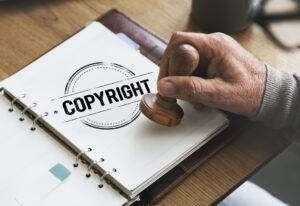What is Copyright

What Is Copyright
The copyright gets its importance from its appearance, duplicate, or words. Initially, it was utilized in 1586. It was the primary thing that was perceived as Intellectual property.
There is a very much settled precept of “Ubi jus ibi remedium”. “where there is a right, there is a cure”. This principle is additionally pertinent to copyright. It gives different privileges to the creator or craftsmen and solutions for safeguarding those freedoms.

Meaning Of Copyright
Copyright is a creation of a statute. It is a form of intellectual property. It is a negative right; since it prevents others from copying or reproducing a work. It is a monopolistic right. Section 13 of the act envisages certain works in which copyright subsists. Section 14 provides for the meaning of copyright. Ipso facto copyright means the right to reproduce the work in which copyright subsists. It is an exclusive right to do or authorize others to do certain acts in relation to-
(a)Literary, dramatic, or musical works;
(b)Artistic works;
(c)Cinematograph films;
(d)Computer programmers/ software programmers;
(e)Sound recording
More so, the exclusive right for doing the respective acts extends not only to the whole of the work, but to any substantial part thereof, or to any translation or adoption thereof.
The right to protection of copyright extends to original, literary, dramatic, artistic, and sound recording.
Characteristics of Copyright
(i)Exclusive right
Copyright means the exclusive right to do or authorize others to do certain acts in relation to (a) literary, dramatic or musical works; (b) artistic works (c) cinematograph films (d) sound recording. Such elite ideal for doing separate demonstrations stretches out not exclusively to the entire of the work, yet to any significant part thereof or to any interpretation of variation thereof.
(ii) Negative Right
An option to keep others from replicating or imitating the work.
(iii) Monopolistic Right
Copyright like the patent is a monopoly restraining the public from doing that which, apart from the monopoly, it would be perfectly lawful for them to do.
(iv) Copyright Is A Form Of I.P.R.
Just like trademark, trade name, and patent right, copyright is a form of I.P.R.
(v) Extensive Right
Copyright is extensive in nature and it extends to replication of copies, etc.
(vi) Global Perspective
Copyright is protectable even beyond the territories of India.
Salient features of Copyright
The Copyright Act, of 1957 is based on the Berne Convention. The Indian Act borrowed its principle from U.K. law.
The Act has the following salient features:-
-
- The Act has created a copyright office and a Copyright Broad to facilitate registration of copyright and to settle certain kinds of disputes arising under the Act and for compulsory licensing of copyright.
-
- The Act defines various categories of works in which copyright subsists and the scope of the rights conferred on the author under the Act.
-
- The Act lays down terms of copyright for different categories of works.
-
- The Act defines infringement of copyright and provides civil and criminal remedies against infringement.
-
- The Act emprovisioned first owner of copyright in a work.
-
- The Act provides for international copyright.
-
- The Act specifically provides for rights of authors of work.
-
- The Act specifically provides for civil and criminal remedies for infringement and damages thereof.
-
- The Act deals with rights of performers and broadcasters.
The procedure of registration of copyright
Registration Of Copyright
Chapter X, The copyright Act, 1957, i.e., Section 44 to 50-A and Chapter VI of the copyright rules 1958,i.e., Rules 15 to 20 deals with Registration of copyright.
Essentials For Registration
Rule 15 provides for six separate registers of copyrights. More so, Rule 16 (g) of the rules provides for the procedure of registration, as under:-
-
- Application for registration of copyright should be made in accordance with prescribed Form IV.
-
- Such application should be in regard to one work just, and should be in three-fold and should be alongside determined expense.
-
- The person applying for such registration has to give notice of his application to every person who claims or has any interest in the subject matter of the copyright or disputes the right of the applicant to it.
-
- Within 30 days of the receipt of such application the Registrar receives no objection to such registration, he may enter such particulars in the Register of copyright.
-
- If the Registrar is not satisfied about the correctness of the particulars given in the application, he may hold such inquiry into as he deems fit.
Rights of the copyright owner
The copyright connotes the exclusive right to do or authorize the doing of any of the following acts in respect of a work or any substantial part thereof; of
-
- Re: Literary, Dramatic or musical work
-
- To reproduce the work in any material form including the storing of it any medium by electronic means.
-
- To make any translation/adaptation of the work.
-
- Re: Computer Programmers.-
-
- To sell or give on commercial rental or offer for sale or for commercial rental any copy of the computer programmers.
-
- Re: Artistic work.-
-
- To reproduce the work in any material form.
-
- To communicate the work to the public.
-
- To make any adaptation of the work.
-
- Re: Cinematograph Film.-
-
- To make any copy of the film, including a photograph of any image forming part thereof.
-
- Re: Sound Recording.-
-
- To make any other sound recording embodying it.
Whether Registration Essential
The registration of copyright has not been made necessary under the Copyright Act, 1957. More so, the copyright exists whether the registration is done or not, and the registration is merely a piece of evidence as to when a certain author started claiming copyright in some artistic or some other work.
Similarly, it has been held that registration of copyright is not essential. More so, the absence of such registration does not preclude the rights of the owner of the copyright.
Further, non-registration of a work does not debar action against infringement of copyright.
Infringement of copyright
The exclusive right of the copyright owner includes publication, reproduction, storage, adaption, translation, the performance of work, etc. Where any of the aforesaid acts relating to work is carried out by a person other than the owner without a license from the owner or a competent authority under the Act, it comprises an encroachment of copyright in the work.


INVEST MP Expression of Interest (EOI) For Inviting Online Tender…
Read More
Special Advance Authorization for Garments View Sample Report Directorate General…
Read More
Unutilized Input Tax Credit Refund Under GST View Sample Report An…
Read More
What is MSME Loan? View Sample Report Entrepreneurs and business owners…
Read More
ICICI Bank Business Loan View Sample Report ICICI Bank business loan…
Read More
PNB Bank Business Loan View Sample Report (Punjab National Bank) PNB Bank Business…
Read More
HDFC Bank Business Loan View Sample Report HDFC Bank Business Loan…
Read More
Equipment Finance Scheme For Existing Clients – TIIC View Sample…
Read More
Documents Required For GST Registration View Sample Report Goods and Services…
Read More
Most Popular Loan Schemes In India In 2024 View Sample Report The following…
Read More
Citibank Business Loans View Sample Report Citibank Business Loan provides business…
Read More


